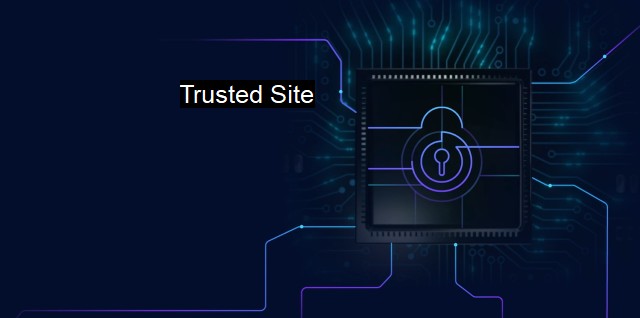What is Trusted Site?
The Important Role of Trusted Sites in Ensuring Secure Online Activities in Cybersecurity and Antivirus
A "Trusted Site" in the realm of cybersecurity and antivirus refers to a reliable web domain acknowledged and approved by users' web browsers or antivirus software as legitimate and safe. It is a determined designation that the website adheres to acceptable internet safety standards and does not contain potential phishing scams, viruses, or any other internet threats.In the breakneck pace of our digital life, we often discover unknown websites either by browsing or through the countless pop-ups and ads we encounter daily. Notably, not every website found on the web is to be trusted. The inception of the internet has undeniably opened up doors to unfathomable knowledge, but it also brings a multitude of security challenges and risks like malicious viruses and malware attacks, phishing scams, and data breaches. In this digital era, ensuring the sites where we input our personal or sensitive information are trusted sites is a critical aspect of maintaining good cyber hygiene.
Fundamentally, a trusted site is deemed secure primarily based on the encryption it uses, mainly through HTTPS. HTTPS, or Hypertext Transfer Protocol Secure, provides an additional layer of security while transporting data between the browser and the website yet promising an identity check of the website to its users. When a website holds an HTTPS certification, it indicates that the website encrypts all transmitted data, keeping it safe from external visibility or interception by hackers.
Secondly, trusted sites are typically backed by legitimate organizations or bodies that pledge to maintain their users' privacy and security, reflected in comprehensive privacy and security policies. Also, various online security providers, including antivirus software, differentiate unsecure sources from trusted sites using a repertoire of continuously updated virus definitions, inspection of unusual site behaviour, and user reports.
Advertising networks closely monitor trusted sites that run their ads because cybercriminals commonly indulge in a practice called 'malvertising' where harmful ads are used to propagate viruses and other malicious software. Hence, a clean slate in ad-mining activities is another informal measure of credibility for trusted sites.
Trusted sites usually carry site seals, typically displayed at the bottom of the website depicting a logo of the issuing authority like Norton or McAfee. Authenticating these site seals alone can help users discern a legitimate website from an illicit sham. While seemingly trivial, these seals are actually a compact package of information about the reputation of the site owner, its activities, financial details, and other accreditation.
The Verb Cyber Assurance rating is a worldwide standard for identifying trusted sites. This badge guarantees that the site has been vetically checked against 52 commercially honored security standards. The certification mentions that the site's domain is authenticated, the site has a valid SSL certificate, and the site is free from common vulnerabilities that hackers exploit.
Nonetheless, while technology continues to advance at an accelerating pace, so does the sophistication of cyber threats. Therefore, users should exercise cognitive consciousness around their online activities. Visiting only trusted sites is a cardinal rule of staying safe in the digital world. Evaluating website accuracy, objectivity and checking the site's privacy policy, the presence of SSL certificate, and updates towards the latest HTTPS protocol can all act as preliminary checkpoints in identifying a trusted site.
Trusted sites play a pivotal role in the cybersecurity and antivirus domain as they help minimize the potential risks and threats of unsafe navigation online. They uphold the principles of safety, security, and sanity providing its users a safer digital experience. The identification of these trusted sites, spearheaded by thorough web security tests, is a result of multinational cooperation among independent bodies, web browsers, and antivirus software; it is a manifestation of a digitally connected but also protected world. Users can utilize the established tools and indicators to recognize these trusted sites and ensure their digital footprint remains secure and unexploited.

Trusted Site FAQs
What is a trusted site in terms of cybersecurity?
In cybersecurity, a trusted site refers to a website that is deemed safe and secure to interact with.Why is it important to only use trusted sites for antivirus downloads?
It's important to download antivirus software only from trusted sites to ensure that you are not inadvertently downloading malware or other harmful software that can compromise your system.How can I identify if a site is a trusted site?
You can identify a trusted site by looking for security indicators such as the padlock symbol in the address bar, HTTPS in the URL, and trust seals from reputable organizations.Can a site become untrusted over time?
Yes, a site can become untrusted over time if it has a history of security breaches or suspicious activities. It's important to continually evaluate websites you interact with and avoid those that may put your cybersecurity at risk.| | A | | | B | | | C | | | D | | | E | | | F | | | G | | | H | | | I | | | J | | | K | | | L | | | M | |
| | N | | | O | | | P | | | Q | | | R | | | S | | | T | | | U | | | V | | | W | | | X | | | Y | | | Z | |
| | 1 | | | 2 | | | 3 | | | 4 | | | 7 | | | 8 | | |||||||